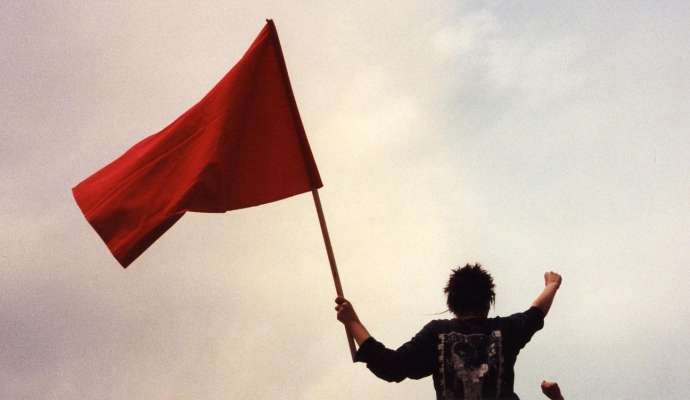STA, 30 April 2020 - For the first time after World War II, Labour Day in Slovenia will pass without traditional bonfires, gatherings and reveille. Trade unions have called on people to hang out red flags, shirts and flowers from their balconies instead, declaring they will not let workers shoulder the burden of the coronavirus crisis alone.
Noting the 130th anniversary of the first Labour Day celebration, the ZSSS, Slovenia's largest association of trade unions, said that "everyone deserves workers' rights, decent pay and decent work", no matter what their job, where or in what form they perform it.
The union said that the current crisis laid bare further the problem of precarious forms of employment that did not afford a decent life, and it demonstrated how important quality public services such as healthcare, self-sufficiency, protection of privacy, personal data and human rights are.
The ZSSS also notes new issues raised by the Covid-19 emergency, such as reconciling work from home with family life and the "right to disconnect", while wondering whether it will act as a catalyst for a breakthrough in automation, digitalisation and robotisation.
"We cannot prevent change, but we can shape and direct it. The key role here is informing and educating about the new circumstances, about rights and potential solutions," ZSSS head Lidija Jerkič said.
In a separate message ahead of Labour Day, her counterpart from the Pergam association Jakob Počivavšek said that the coronavirus crisis shed light on the many systemic shortcomings that the unions had so far been warning of in vain.
As one such he cited neglect of social dialogue, "which should be absolutely necessary in these times when key decisions and measures are being taken that will affect the future as well".
He said that history had shown that social dialogue had been decisive for progress, development and preservation of the welfare state. "Despite the criticism of trade unionism, which is often unjustified and based on prejudice and ideology, fact is that without trade unions' efforts workers would be much worse off now and our society poorer and more stratified."
After the crisis caused by the pandemic, Počivavšek expects solidarity put to test. "We learnt a lot about that during the financial crisis. This time we will demand the solidarity of capital, of employers with workers, with the society they operate in and benefit from."
He said that businesses were getting a lot from the stimulus package, so they should take their share of the burden of fiscal consolidation once the epidemic is over.
"This time around it cannot be done on the shoulders of workers, social transfers, social insurance rights and the wages of public and private sector employees. The experience of the financial crisis has taught us this is a wrong path that impoverishes people and stifles economic growth."
Meanwhile, the KS 90 trade union organisation from the coastal region called for an epidemic of change "as a result of which work will have its honour and power restored, while the system that is based on exploitation, deepening of social differences, corruption and systemic creation of the poor will be banished to the past".
Indicating that he is well aware of the concerns amid the uncertainty about jobs that accompanies this year's Labour Day, Labour Minister Janez Cigler Kralj told employees they were not alone in this crisis, promising the government is doing all in its power to protect jobs.
"Many are working from home, may be furloughed, while there is a great deal of uncertainty at any rate. Thus it is the more important for you to know that you are not alone in crisis," the minister said in his message, thanking all workers and volunteers.
"The anti-crisis measures that we have prepared and will still are aimed at preserving as many jobs as possible. It is owning to all those measures taken in particular that the labour market has not been hit as hard as it would have been had the state not intervened."
Apart from the need for suitable pay and proper balance between rights and obligations, the minister also noted the importance of safety for dignified work. "During the epidemic in particular, it has been shown how important it is to ensure safety and health at work and monitor and manage the many psychosocial risks."
He appealed on companies to remember the situation before the pandemic and bear in mind how hard it is to find and keep good workers. He also hailed work from home as an efficient solution to prevent the spread of the virus and reconcile professional and family life.
On the eve of Labour Day, representatives of trade unions from Slovenia and Italy gathered for their traditional get-together at the Škofije border crossing, albeit in a much scaled-down format due to the coronavirus emergency.
The unions called on the authorities in both countries to enter into talks to regulate the status of an estimated 15,000 workers who migrate daily to work in the other country, and give them the same level of rights as the workers in their home countries enjoy.







